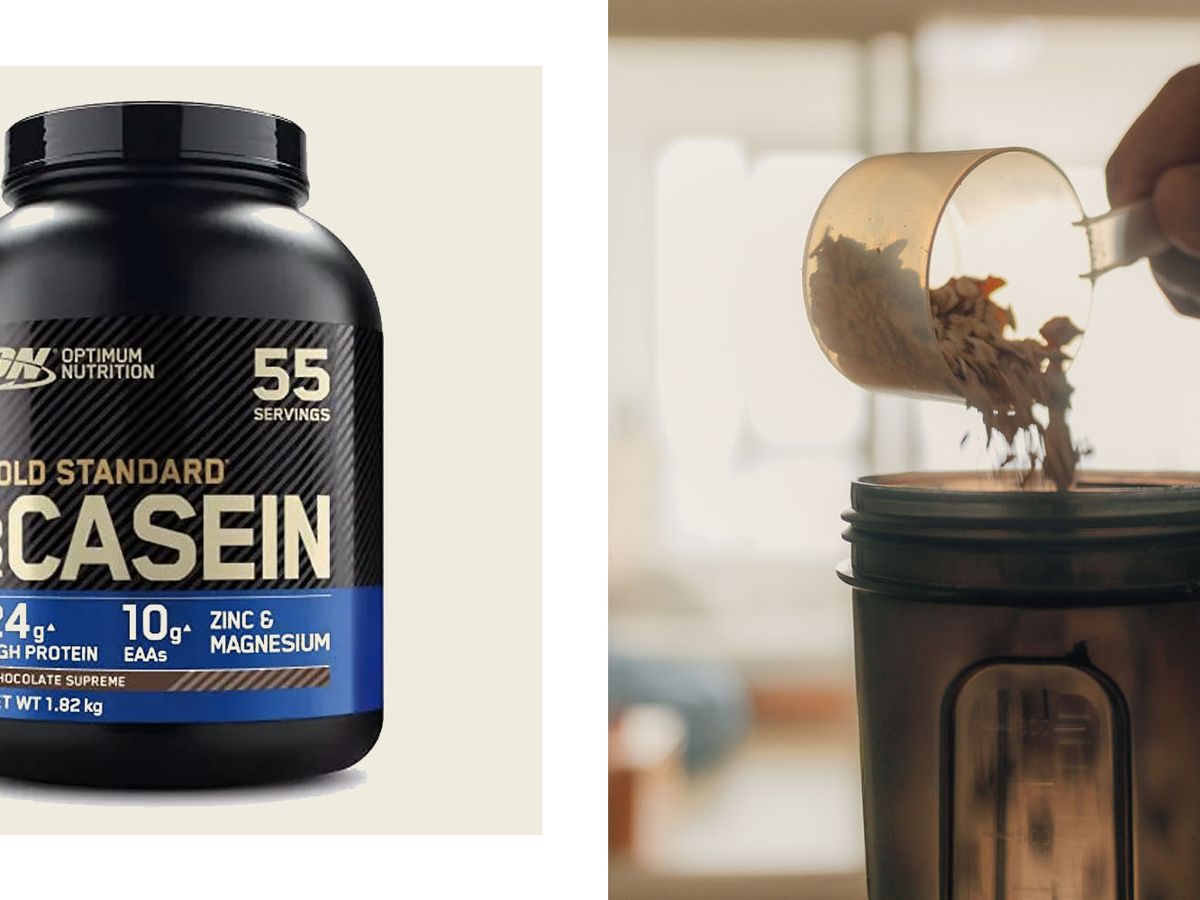Casein comes from milk, much like whey. Unlike whey, it is absorbed slowly by the body. As a prolonged-release protein, it can assist muscle repair and growth throughout the night.
Casein is a slowly digested dairy protein commonly taken as a supplement.
Because it supplies amino acids gradually, many people consume it before sleep to aid recovery and limit muscle breakdown while they rest.

Multiple studies have demonstrated its role in promoting muscle growth, along with a variety of additional benefits.
Casein and whey both originate from milk
Milk contains two primary protein types — casein and whey. Casein accounts for roughly 80% of milk protein, while whey makes up the remaining 20%.
Casein protein is processed slowly by the digestive system, whereas whey is absorbed rapidly. This is a key distinction between these two commonly used dairy proteins.
Like other animal-derived proteins, casein is a complete protein. That means it supplies all the essential amino acids your body requires for repair and growth.
It also includes several distinctive proteins and bioactive elements, some of which provide health-promoting actions.
There are two principal varieties:
- Micellar casein: The most commonly used form, characterized by slow digestion.
- Casein hydrolysate: A predigested form that is absorbed more quickly.
A 33-gram (1.16-ounce) scoop of typical casein powder delivers about 24 grams of protein, 3 grams of carbohydrates and 1 gram of fat (4).
It may also supply various micronutrients (for example, calcium), though exact contents vary by brand.
Bottom Line:Casein is a milk-derived protein that digests slowly and contains all essential amino acids needed by the body.
Casein digests far more slowly than whey
Casein is well known as a “time-release” protein because it is absorbed slowly in the digestive tract.
This means it provides a steady, low-level supply of amino acids to tissues over an extended duration.
It can support protein synthesis even during periods when the body might otherwise break down muscle for fuel, such as during prolonged fasting.
Because of this, it is often described as “anti-catabolic” and helps limit muscle breakdown.
One experiment compared digestion rates by giving participants either a casein or whey shake and tracking blood amino acid levels—particularly leucine—over seven hours.
Researchers observed a faster and larger initial rise with whey due to its quick absorption. While casein produced a smaller early peak, its levels remained more stable over time.
In another trial, investigators measured circulating leucine after administering whey or casein protein and monitored the response for seven hours.
The whey group experienced about a 25% greater increase in circulating leucine, indicating more rapid digestion.
That sustained amino acid supply in the casein group reduced the amount of protein used as fuel across seven hours, improving net protein balance — an important factor for building and preserving muscle.
Bottom Line:Casein acts as an anti-catabolic protein. Its slow digestion rate and prolonged release of amino acids help decrease protein breakdown in the body.
Casein is highly effective for building muscle
Bodybuilders and athletes have relied on this supplement for many years.
As a complete animal protein, it provides all essential amino acids the body cannot synthesize, including substantial amounts of leucine, which triggers muscle protein synthesis.
If your overall protein intake is low or moderate, adding casein can help stimulate muscle growth simply by increasing total protein consumption.
One study compared a casein supplement group to a whey group and a no-protein control.
The researchers reported that participants taking casein experienced twice the muscle gain and three times the fat loss compared to the placebo group. The casein group also lost more fat than the whey group.
Casein may also promote long-term muscle retention by reducing daily protein breakdown, a process that accelerates when energy or amino acid availability is low, and during intense exercise or weight loss.
For this reason, many people use casein at night to prevent overnight muscle breakdown during the long period without food.
In one study, consuming a casein shake before sleep helped strength-trained men enlarge type II muscle fibers by 8.4 cm2 in the supplement group versus 4.8 cm2 in the training-only control (15).
The casein group also showed greater strength gains, roughly 20% more than the training-only group.
Bottom Line:Similar to whey, casein has been repeatedly shown to increase muscle mass and strength when combined with resistance training and may assist with fat loss.
Other potential health benefits of casein

Some early research suggests casein may offer additional health advantages, including:
- Antibacterial and immune effects: Certain cell studies indicate it might have antibacterial properties, support immune function, and help lower blood pressure.
- Lower triglycerides: In one small trial with 10 overweight participants, casein reduced post-meal triglyceride levels by 22%.
- Antioxidant activity: Some peptides derived from casein may act as antioxidants and help neutralize harmful free radicals.
- Fat loss: A 12-week training study reported that average fat loss among those taking the supplement was three times greater than in a placebo group.
Bottom Line:While more human research is needed, preliminary findings indicate casein may enhance aspects of health such as lowering triglycerides and aiding weight loss.
Are there any adverse effects?
The belief that high protein intake causes health problems has been refuted repeatedly.
Direct research and reviews show no harmful effects in healthy people.
The main exception is individuals with existing kidney or liver disease, who might need to restrict protein intake.
Consuming one to two scoops of casein per day is unlikely to produce noticeable or serious side effects in healthy people.
However, some individuals are allergic to casein or intolerant to lactose, which can be present in small quantities in casein supplements.
Others might experience bloating or other digestive discomforts, though this varies between people.
Overall, like whey, casein is considered safe for human consumption and may offer notable long-term health benefits.
Bottom Line:As with most protein sources, it is safe for routine use and could deliver lasting health advantages.
The A1 versus A2 debate
Cows produce slightly different variants of casein proteins.
Beta-casein, one of the proteins in casein, exists in different forms. Most bovine milk contains a mix of A1 and A2 beta-casein, while certain breeds produce milk containing only A2 beta-casein.
Some observational studies have linked A1 beta-casein to health concerns like type 2 diabetes and heart disease.
However, observational data show associations and are not definitive; other studies report no harmful effects from A1 beta-casein.
Research on A1 versus A2 beta-casein is ongoing, but for most people it’s not currently a pressing concern. If you want more detail, there are dedicated articles that explore the topic further, such as what is casein.
Bottom Line:Some observational evidence associates A1 beta-casein with health issues, but the findings are far from conclusive.
How to use casein supplementally to get the most benefit
Casein powder is a convenient, high-quality protein source.
If you plan to take it around workouts, a faster-absorbing form like casein hydrolysate makes sense — or you might simply choose whey for post-workout use.
Most consumers take casein before sleeping.
For instance, you can mix 1–2 scoops (25–50 grams) of casein protein powder with water in a shaker bottle or blend it with ice.
You can also stir casein with water in a bowl until it becomes pudding-like, then pop it in the freezer for a few minutes to get an ice-cream-like texture, especially with chocolate or vanilla flavors.
Natural dairy foods are also rich in casein. Milk, plain yogurt and cheese contain high amounts of this protein.
Common ways to get substantial dairy protein without excess calories include cottage cheese or high-protein natural yogurt.
Bottom Line:Casein is versatile and can be used regularly to raise your overall protein intake. It’s often best taken before bed or during extended periods without food.
Conclusion
Casein is a slowly absorbed protein that supports muscle growth and recovery after exercise.
Using it can benefit your health and help increase daily protein intake — an important element for fat loss and muscle development.
Try 1–2 scoops of casein powder or a large glass of milk before bedtime to enhance recovery and limit overnight protein breakdown.
Ultimately, casein is an underrated quality protein source. You’re likely to be pleased if you give it a try.
More about protein:
- 10 Evidence-Based Health Benefits of Whey Protein
- How Protein Shakes Help You Lose Weight and Belly Fat
- The 7 Best Types of Protein Powder
- 10 Science-Backed Reasons to Eat More Protein
























Leave a Reply
You must be logged in to post a comment.